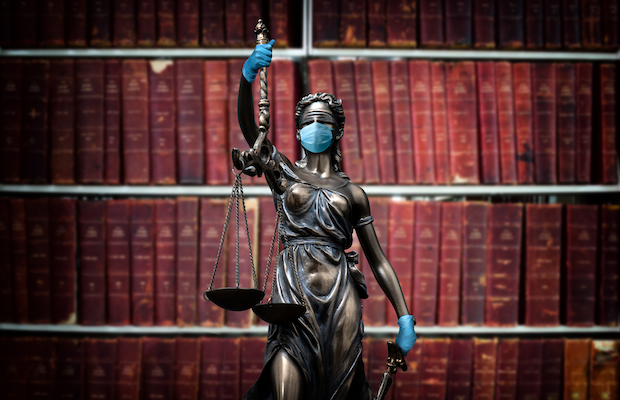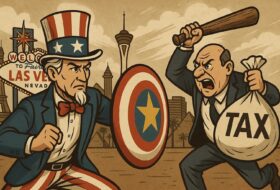
The United States Court of Appeals for the First Circuit heard arguments today on the scope of the federal Wire Act.
The case, formally New Hampshire Lottery Commission, et al v. Barr, et al, pits the US Department of Justice against the cooperative expansion of state-regulated gambling. An opinion penned by the department’s Office of Legal Counsel in late 2018 could criminalize things like online lottery sales and multi-state poker.
The NHLC and its vendors, NeoPollard Interactive and Pollard Banknote, raised the initial lawsuit early last year. Today’s appellate proceedings stemmed from the subsequent District Court decision to reject that OLC memo and affirm that the Act applies narrowly to sports gambling.
Whatever decision ultimately emerges from the First Circuit will have significant implications for the future of legal online gambling in the US.
Wire Act appeal arguments by teleconference
Most of the nation’s courthouses remain closed due to the coronavirus pandemic, and the First Circuit Court of Appeals is no exception. Its location in Boston, near the epicenter of the US outbreak, means it will likely be among the last to reopen.
In the meantime, the court is hearing cases like this one via teleconference. The two parties had 16 minutes apiece to present their arguments before a panel of three judges:
- Juan Toruella
- Sandra Lynch
- William Kayatta Jr.
Judge Toruella is the longest-tenured of the three, having served the court since his nomination by Ronald Reagan in 1984. Judges Lynch (1995) and Kayatta (2013) are nominees of Bill Clinton and Barack Obama, respectively.
Arguments began at 10 a.m. and are archived here.
Live updates from Wire Act appeal
10:00 a.m. — Right on time, the court is called to order.
10:01 a.m. — Appellants are first to make their arguments, and counsel leads by reiterating that OLC did not opine on whether the Act applies to state lotteries and their vendors. The DOJ appeal boils down to this sentiment: “As of right now, plaintiffs face no threat of prosecution for anything they’ve done in the past, anything they’re currently doing, or anything they will do in the future indefinitely.”
Questions from Judge Torulla
10:04 a.m. — Judge Toruella asks the day’s first question: “Am, I to understand that there’s no possibility that the 2018 Office of Legal Counsel interpretation of the statute could be enforced at any time in the future?” DOJ counsel simply responds that the plaintiffs will not pursue enforcement at the current time. “[The department] has no position on that question. We’re not arguing that what they’re doing is unlawful.”
10:06 a.m. — In a sightly contentious exchange, the judge asks whether or not the 2018 opinion represents a change in the department’s interpretation of the Wire Act. Counsel acknowledges that it does, but two attempts to add caveats draw a small scolding from the court. This question gets to the issue of whether or not the plaintiffs had the legal standing to bring the lawsuit to begin with.
10:09 a.m. — The DOJ’s argument continues to orbit around its claim that the 2018 opinion is not a justiciable action. “There’s no threat of enforcement against these parties. There’s no threat of enforcement against other state lotteries.”
Questions from Judge Lynch
10:10 a.m. — In her first question, Judge Lynch notes that the DOJ only yielded the possibility of enforcement action against lotteries after the NHLC filed suit. Counsel for the DOJ works to dispel the notion that the memo criminalizes the lottery, but the judge repeats a line of logic used by the District Court: “Nothing in your 2018 interpretation excluded state lotteries.” Lynch asks if the appellants’ position is that the case is not ripe to due vagueness in the OLC memo. “I suppose so,” counsel responds.
10:15 a.m. — More from Judge Lynch: “Is it really the position of the government now that you are taking no position whatsoever as to the meaning of the Wire Act as challenged in this lawsuit?” DOJ counsel is forced to choose words carefully, laying out a seemingly dichotomous argument. On the one hand, the government contends that the Wire Act is not uniformly limited to sports betting. On the other, it is unwilling to take any position on the legality of state lotteries under that same Act.
Questions from Judge Kayatta
10:17 a.m. — Online poker gets its first mention of the day. DOJ counsel argues that testing this enforcement plan against non-sports gambling companies, like online poker sites, would constitute grounds for a judicial review. Pre-enforcement review, however, is not the court’s responsibility.
10:20 a.m. — In the continued exchange surrounding enforcement, the DOJ loosely suggests that it has contemplated the opinion’s impact on interstate poker. Counsel makes a passing mention that online poker sites are currently in the forbearance period for compliance.
NHLC arguments
10:22 a.m. — Counsel for the plaintiffs restate their argument that the 2018 OLC opinion criminalizes modern-day lottery operations.
10:24 a.m. — Judge Toruella asks if the appellees understand the government’s position regarding non-enforcement against lotteries. “No, your honor,” counsel answers. “We understand the April 8, 2019 memo to be an act of prosecutorial discretion[…] that could be retracted tomorrow.”
10:28 a.m. — Judge Lynch has a prolonged exchange with counsel, poking around at other federal laws that could be impacted by a change in Wire Act enforcement. In particular, she notes that this suit may brush up against larger 10th Amendment concerns regarding states’ rights.
10:30 a.m. — Judge Kayatta is particularly interested in changes to the punctuation Congress made while drafting and amending the Act nearly 60 years ago. What follows is a lengthy parsing of the Act’s grammar and syntax.
NeoPollard arguments
10:33 a.m. — The vendor argues that there is no ambiguity regarding the applicability of the 2018 memo to state lotteries. Counsel also addresses the DOJ’s position that Congress alone has the power to alter the scope of the Wire Act. A broadened OLC interpretation, it follows, can not be valid.
10:36 a.m. — Judge Lynch notes that the case is an apparent mix of civil and criminal law from a ripeness standpoint. “The government tends to pose the argument as if it’s merely a question of risk of enforcement[…] You ask us to parse the language and look at it in terms of the lack of any assurance of non-prosecution after clear statements that seem to say that the lotteries were subject to prosecution.”
10:39 a.m. — Responding to a question from Judge Kayatta, counsel argues that the 2018 update is unusual in that it “perform[s] a rule-making function.”
This quote is particularly pointed — and even includes a reference to the suspected influence of Sheldon Adelson on the OLC’s change of heart:
“It’s not deliberative advice internal to the department. It’s an edict solicited by interested private persons that was published to the public at-large precisely to end businesses’ reliance on the 2011 OLC opinion and to generate compliance in that public at-large with the new opinion[…] The OLC opinion purports to give an authoritative interpretation of a statutory provision that has a direct effect on the day-to-day business of the plaintiffs. I’m not aware of any other OLC opinion that does that.”
Counsel contends that the memorandum opinion binds the department to enforcement.
DOJ rebuttal
10:43 a.m. — DOJ counsel asked to reserve a few minutes for rebuttal, which the court granted. The crux of its counterargument is that the court would be overstepping its bounds by issuing an advisory opinion on a pre-enforcement memo. “OLC does not have a rule-making function, despite what [NeoPollard counsel] says.”
10:45 a.m. — Counsel reiterates that the opinion does not contemplate the applicability of the Act to state lotteries. “We will not prosecute you, and we have no position on whether you are covered by the Act.”
10:47 a.m. — Arguments conclude.
Here’s what led to the DOJ appeal
The OLC memorandum opinion, drafted in late 2018 and published in early 2019, sought to extend enforcement of the antiquated federal law to all forms of interstate gambling. Such an interpretation represents an about-face from previous guidance issued by the same office in 2011.
Pushback from states with legal online gambling was immediate, and the NHLC promptly took the matter to court.
With Pollard’s support, the lottery filed suit in an attempt to protect its online products and the multi-state structure for retail games like Powerball. In the time since that filing, it has additionally begun offering NH sports betting online under a partnership with DraftKings.
The two parties first argued their case in New Hampshire District Court in April 2019.
Judge Paul Barbadoro rendered a decision for the plaintiffs, finding that the correct reading of the statute in question was a narrow one — based on both its legislative history and a plain-language interpretation of its wording. In short, he ruled that the Wire Act only applies to interstate sports gambling. The summary judgement he issued provided complete relief by setting aside the 2018 OLC opinion in full.
During arguments, Barbadoro opined that the case was likely destined for the Supreme Court regardless of his ruling. This First Circuit appellate court would be the last stop on that path.
Wire Act arguments in a nutshell
The two parties have exchanged briefs all year long, so none of today’s arguments were new. The defense is essentially a three-pronged attack on the District Court decision.
The DOJ argues that:
- The Wire Act applies to non-sports gambling.
- The lower court ruling is tantamount to an unlawful advisory opinion.
- Judge Barbadoro erred in “purporting to set aside” the 2018 OLC opinion.
The first point relies on the fact that the original statute was constructed in a way that leaves the underlying congressional intent unclear. The proceedings therefore included some tedious grammatical arguments regarding the series-qualifier canon and the rule of the last antecedent.
On the last two points, the appellants contend that an OLC opinion does not constitute a “final agency action” and is therefore not subject to judicial review. The way the court responds to this portion of the government’s case could have implications that stretch far beyond gambling.
The DOJ additionally argues that it has not yet contemplated enforcement action against state lotteries. While it has extended its forbearance period several times since issuing the new opinion, however, it will not make any guarantees beyond the end of 2020.
The plaintiffs have already proved the merits of their case once, convincing Judge Barbadoro that the implied threat of enforcement was sufficient to seek relief — which he granted. Existing case law falls on their side too; the First Circuit previously decided the Lyons case under a narrow (but non-binding) reading of the Act.




